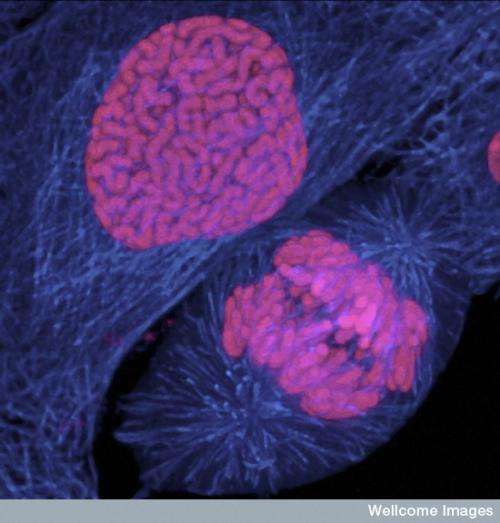Researchers block cancer-related genes with small interfering peptides

Synthetic peptides are showing promise in their ability to prevent out of control tumour growth—and according to researchers are fast becoming the core of new therapeutic opportunities for cancer treatment.
Researchers are engineering small interfering peptides (ipeps) to block the function of cancer-related genes to disrupt intracellular processes in cancer cells.
This strategy targets epigenetic mutations or biological alterations, which are dynamic chemical changes in the DNA structure at the position of tumour genes.
IPeps are designed to reverse the epigenetic state of cancer cells back to normal.
Their effectiveness in breast cancer treatment was recently shown in Oncogene by Dr Pilar Blancafort, head of the Cancer Epigenetics Group at UWA, and her collaborators at the University of North Carolina at Chapel Hill, USA.
The researchers showed that a new type of synthetic iPeps – designed to target transcription factor Engrailed 1 (EN1) in triple negative breast cancer cells – could modify the epigenetic status of the EN1 gene.
EN1-iPeps blocked the expression of this transcription factor in experimental tumor cells in a dish. The absence of EN-1 then activated those intracellular processes that allow normal cells to die. As a result, it stopped the uncontrollable growth.
"We hit a transcription factor that really should not have been there," Dr Blancafort says. EN1 is a brain-specific factor, normally not expressed in breast tissue.
EN1 expression contributes to the stem cell-like profile of the triple negative breast cancer cells, known for their DNA instability and rapidly acquired resistance to chemotherapy—currently the only treatment option.
"Many people understand that cancer has a genetic base, meaning that mutations are driving cancer, but there is now also mounting evidence that the microenvironment of a tumour can modulate its outcome," Dr Blancafort says.
Epigenetic changes in cancer cells, like the level of methylation of specific DNA sites, tend to be reversible. Dr Blancafort says such changes should be seen as new targets for intervention.
She says cancers with poor clinical outcome may benefit most from combining iPeps use with conventional chemotherapy.
This way, the modifying effect of iPeps on the epigenetic profile of the cancer could prevent drug resistance and possibly 'oncogenic addiction'.
"Unlike healthy cells, [oncogenetically addicted] tumour cells show so much plasticity. You hit them at the core, but they still adapt and come up with another solution to survive."
Dr Blancafort, a Spanish cancer geneticist, arrived in WA last year and has since secured research funding from various federal, state and local organisations to move from cell culture studies to safe iPeps use in animal and patient models.














